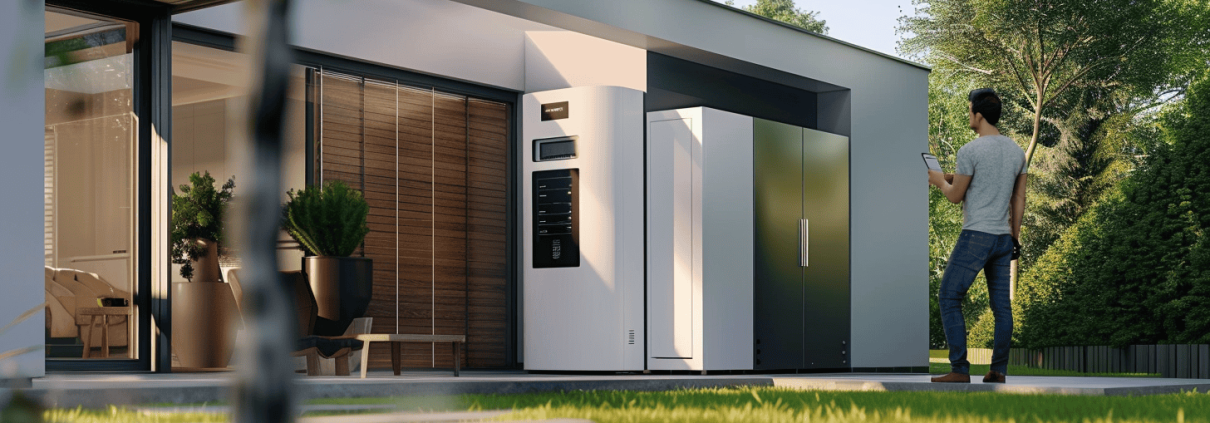Residential Battery Backup Systems: The Key to Energy Independence and Grid Resilience
As extreme weather events, grid instability, and rising electricity costs become more common across the U.S., homeowners are increasingly seeking smarter ways to take control of their energy usage. One solution growing rapidly in popularity is the residential battery backup system. These systems, when paired with solar panels or used independently, enable households to maintain electricity during outages, reduce their utility bills, and contribute to a more sustainable energy future.
In this article, we explore how residential battery backup systems work, why they’re gaining traction in the U.S., and what features to look for when choosing a system that fits your home’s needs.
What Is a Residential Battery Backup System?
A residential battery backup system is an energy storage solution that stores electricity for later use. Most systems are connected to the home’s solar panels and the grid, enabling them to capture excess solar power during the day or store energy from the grid when rates are low. This stored energy can then be used during power outages, nighttime, or periods of peak demand when electricity costs more.
Unlike traditional generators that rely on fossil fuels and manual startup, battery backup systems operate silently, automatically, and without emissions—making them ideal for residential settings.
Why Are Residential Battery Systems Gaining Popularity?
Several converging factors have accelerated the adoption of residential battery systems in the U.S.:
- More Frequent Grid Outages
Power outages caused by storms, wildfires, heatwaves, and aging grid infrastructure are increasingly common. States like California, Texas, and Florida are especially prone to blackouts. A battery backup system provides peace of mind and energy security when the grid fails.
- Time-of-Use (TOU) Rates
Many utility companies now charge different rates depending on the time of day. With a battery system, homeowners can avoid using grid electricity during expensive peak hours by relying on stored energy, reducing bills significantly.
- Federal and State Incentives
The Federal Investment Tax Credit (ITC) currently allows eligible homeowners to claim 30% of the cost of solar-plus-storage systems. States like California, Massachusetts, and New York also offer additional rebates and performance incentives for installing battery storage.
- Sustainable Lifestyle Goals
Environmentally conscious homeowners are switching to battery systems to reduce dependence on fossil fuels and to make the most of their solar energy, especially during cloudy days or nighttime.
Core Benefits of Residential Battery Backup Systems
Let’s break down the primary advantages of installing a home energy storage system:
- Uninterrupted Power Supply: Automatically powers essential appliances like refrigerators, lights, routers, and medical devices during grid outages.
- Lower Utility Bills: Store solar or off-peak electricity and use it when grid power is expensive.
- Energy Independence: Reduce reliance on utility companies and avoid unpredictable rate increases.
- Silent and Clean Operation: Unlike diesel generators, battery systems are noise-free, odorless, and emission-free.
- Home Value Boost: A solar-plus-storage system can increase your home’s resale value and attract eco-conscious buyers.
Must-Have Features in a High-Quality Home Energy Storage Battery
A reliable residential battery must be designed to meet both the power needs of modern households and the reliability expectations of long-term use. Here are the essential features that distinguish a high-quality battery system:
- Advanced Battery Management System (BMS)
- A sophisticated BMS ensures safety by monitoring temperature, voltage, and current across battery cells.
- It enables smart energy dispatch, longer lifespan, and stable performance.
- Long Cycle Life
- Look for batteries with over 3000+ charge/discharge cycles. This translates to 8–10 years of daily use with minimal degradation.
- Scalability
- Modular systems allow you to start with one battery and add more as your energy needs grow.
- High Round-Trip Efficiency
- Top-tier lithium batteries achieve ≥95% efficiency, meaning very little energy is lost during the charge/discharge process.
- Compact and Wall-Mountable Design
- Space-saving form factors ensure easy indoor or garage installation without compromising aesthetics.
- Smart Monitoring
- App-based platforms enable real-time monitoring, performance analytics, and remote troubleshooting.
Learn more about how advanced battery systems work by visiting this home battery storage product page.
Choosing the Right System: Key Considerations
When selecting a residential battery system, it’s not just about capacity. Consider these factors:
- Daily Power Needs: Estimate how much energy your essential appliances consume.
- Backup Duration: Determine how long you want your system to sustain your household during outages.
- Solar Compatibility: Ensure seamless integration with your rooftop solar system, if applicable.
- Inverter Type: Hybrid or AC-coupled inverters can affect installation complexity and cost.
- Warranty and Support: Look for products with 10+ year warranties and strong after-sales service.
Real-World Use Case: 24-Hour Home Resilience
Imagine a family living in hurricane-prone Florida. Their home is equipped with a rooftop solar array and a battery backup system. During the day, solar panels power the home and charge the battery. When a storm knocks out the grid, the battery automatically kicks in, running lights, fans, the refrigerator, and even powering their home office setup without interruption.
Over a year, they reduce their electric bill by 40% through time-of-use optimization and enjoy peace of mind, knowing they’re prepared for any outage.
Looking Ahead: The Role of Home Battery Systems in the Energy Transition
Residential battery systems are more than just a backup power source—they’re a building block of tomorrow’s decentralized, carbon-free energy grid. As utilities shift toward virtual power plants (VPPs) and distributed energy resources (DERs), homeowners with battery systems may eventually be able to sell excess stored power back to the grid or participate in local energy markets.
Battery storage is not just a convenience—it’s a long-term investment in energy independence, resilience, and sustainability.
Conclusion
Whether you’re looking to reduce energy bills, protect your family during blackouts, or live more sustainably, a residential battery backup system is a smart and future-proof choice. By understanding how these systems work, what features to look for, and how to integrate them into your home, you’re well on your way to achieving energy freedom.
Explore available home battery solutions that can power your home safely, efficiently, and cleanly—day or night.


